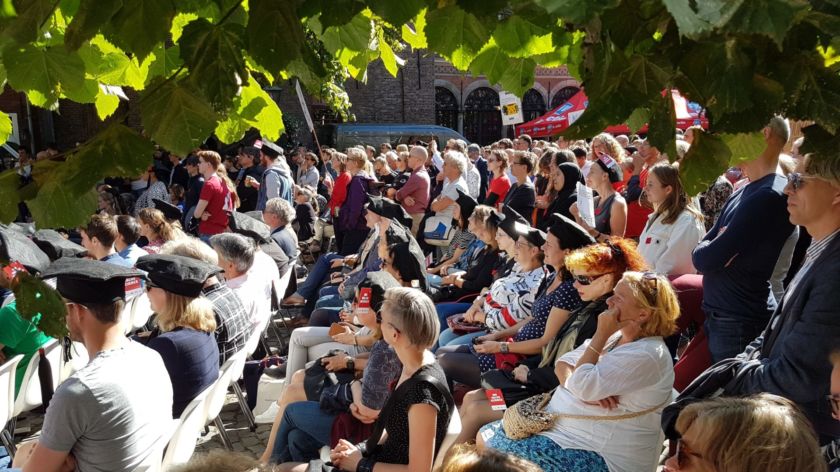‘Universities need to get rid of disposable contracts’
-
 De Ware Opening van het Academisch Jaar in Leiden, september 2019. Foto: Vox
De Ware Opening van het Academisch Jaar in Leiden, september 2019. Foto: Vox
Good employment practices and additional funds for higher education. Unions AOb and FNV and the action group WOinActie will bring attention to these two themes at the alternate opening of the academic year in Utrecht next Monday. A group of scientists from Nijmegen, too, prefers this alternate opening to the regular opening in Nijmegen.
There is a price to pay at the start of the academic year. Under this pretext, education unions AOb and FNV and action group WOinActie want to draw attention to extra financing for higher education at the opening of the new academic year.
The organizers will give ‘awards’ to the universities with the most overcrowded education, the largest amount of ‘disposable teachers’ and the most expensive Executive Boards during the alternate opening. They will present an alternate budget plan to the outgoing Minister of Education Ingrid van Engelshoven (D66).
‘Higher education needs to be given 1.5 billion euros to correct what went wrong the last two decades’, says Arnoud Langendijk, a professor of Economic Geography and the chair of his sector at the AOb. He will go to the Pieterskerkhof in Utrecht with a group of scientists from Nijmegen. ‘We also have a message for the universities themselves: their staff policy can be majorly improved.’
How?
‘By making more permanent jobs available. By not working with ‘revolving doors’ constructions. By making sure that education and research are properly integrated. By not hiring disposable teachers. There is gender inequality in the area of salaries.’
‘It is ridiculous to hire PhDs as second-class employees’
‘We also think that members of the Executive Boards of universities should not be allowed to earn more than the Balkenende norm (no more than 130 percent of the salary of a minister, ed.). It needs to stay within reason.’
How will a cheaper Executive Board change the financial practices of a university?
‘Nothing. It’s more of a signal than our other points of operation, but it is related to ethics and reason. Universities should attract board members who choose the position, rather than the place where they can earn the most money.’
The salary of the Executive Board
The university’s yearly report states that the members of the Executive Board in Nijmegen earned approximately 170.000 euros in 2020, not including expense allowances and 22.000 euros of pension contributions.
How does Radboud University perform in the awards, compared to other Dutch universities?
‘I can’t give away which universities will be awarded, but our university performs decently or even pretty well in a lot of areas. But that doesn’t mean that everything is fine.’
What can be improved?
‘They, too, attract teachers based on a teaching position here, without providing space for research. There are vacancies for a 0,7 FTE teaching position, which are meant for members of staff with research experience and ambitions. Similarly in residual advertisements for 0,3 or 0,4 FTE with, at times, ridiculously high demands.’
Isn’t it good that extra teachers are being hired to tackle the workload?
‘Of course, but that should be done with better jobs. I like to compare it to supermarkets that hire young people to stock the shelves. You can say that they relieve some pressure, but ultimately, you’re hiring second-class employees because you don’t have to give them permanent jobs and you can get rid of them quickly. It is ridiculous to hire PhDs as second-class employees.’
‘We tell departments with these types of residual positions to combine them wherever possible and to create fully-fledged jobs out of them. Add some research to these jobs. And don’t accept second-class positions, neither as an employer, nor as an employee.
‘The sector is entitled to 1.5 billion euros, but it’s not going to be given to us’
The educational unions and WOinActie often take action during the opening of the academic year. Have you achieved a lot with this in the past?
‘Better employment practices are part of the Recognition and appreciation program. We have already contributed a lot to the ambition for a culture change. But in practice it is very difficult, as you can see in lots of places in society. There are faculties that pride themselves on their employment practices, but they still use disposable contracts. We want to change that. This includes changing national policy. That’s why we make our voices heard in The Hague by engaging in a dialogue with politicians.’
The government formation is still ongoing. Are you hopeful that a new government and a new Minister of Education will change things for the better?
‘No, definitely not now that GroenLinks and PvdA are being kept out. The sector is entitled to 1.5 billion euros, but it’s not going to be given to us. We are lucky if they don’t add more notable austerity measures.’
‘We can make improvements, however, using the money we have. Ironically, the temporary jobs, ‘revolving door’ constructions and the competition between researchers that has gone completely out of control are going to cost tons of money. People are less productive, and a lot of time and money is lost in administration. This has to change, and we draw attention to it.’




